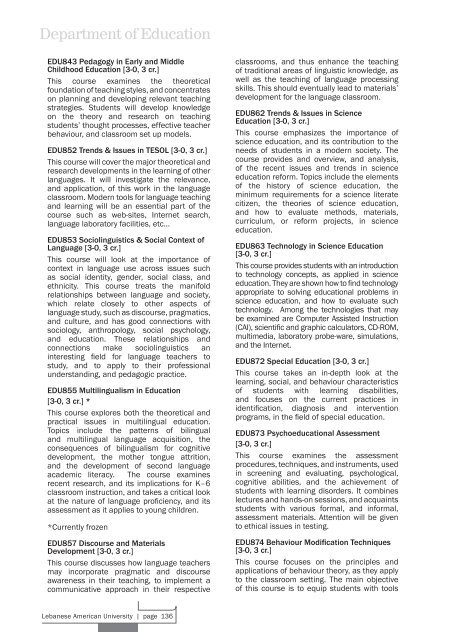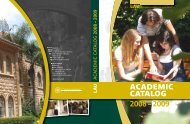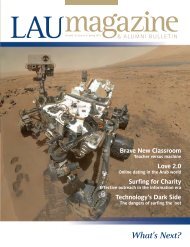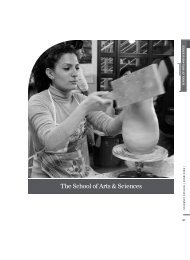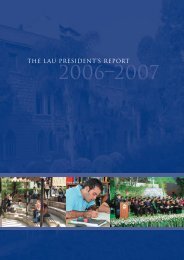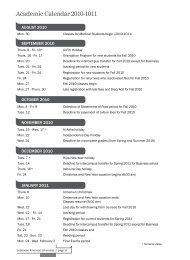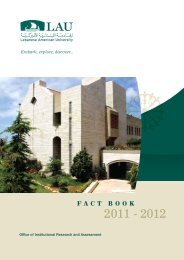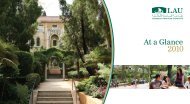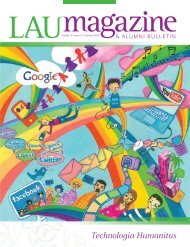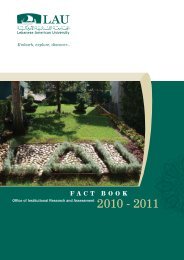academic-catalog2011.. - LAU Publications - Lebanese American ...
academic-catalog2011.. - LAU Publications - Lebanese American ...
academic-catalog2011.. - LAU Publications - Lebanese American ...
You also want an ePaper? Increase the reach of your titles
YUMPU automatically turns print PDFs into web optimized ePapers that Google loves.
Department of Education<br />
EDU843 Pedagogy in Early and Middle<br />
Childhood Education [3-0, 3 cr.]<br />
This course examines the theoretical<br />
foundation of teaching styles, and concentrates<br />
on planning and developing relevant teaching<br />
strategies. Students will develop knowledge<br />
on the theory and research on teaching<br />
students’ thought processes, effective teacher<br />
behaviour, and classroom set up models.<br />
EDU852 Trends & Issues in TESOL [3-0, 3 cr.]<br />
This course will cover the major theoretical and<br />
research developments in the learning of other<br />
languages. It will investigate the relevance,<br />
and application, of this work in the language<br />
classroom. Modern tools for language teaching<br />
and learning will be an essential part of the<br />
course such as web-sites, Internet search,<br />
language laboratory facilities, etc...<br />
EDU853 Sociolinguistics & Social Context of<br />
Language [3-0, 3 cr.]<br />
This course will look at the importance of<br />
context in language use across issues such<br />
as social identity, gender, social class, and<br />
ethnicity. This course treats the manifold<br />
relationships between language and society,<br />
which relate closely to other aspects of<br />
language study, such as discourse, pragmatics,<br />
and culture, and has good connections with<br />
sociology, anthropology, social psychology,<br />
and education. These relationships and<br />
connections make sociolinguistics an<br />
interesting field for language teachers to<br />
study, and to apply to their professional<br />
understanding, and pedagogic practice.<br />
EDU855 Multilingualism in Education<br />
[3-0, 3 cr.] *<br />
This course explores both the theoretical and<br />
practical issues in multilingual education.<br />
Topics include the patterns of bilingual<br />
and multilingual language acquisition, the<br />
consequences of bilingualism for cognitive<br />
development, the mother tongue attrition,<br />
and the development of second language<br />
<strong>academic</strong> literacy. The course examines<br />
recent research, and its implications for K–6<br />
classroom instruction, and takes a critical look<br />
at the nature of language proficiency, and its<br />
assessment as it applies to young children.<br />
*Currently frozen<br />
EDU857 Discourse and Materials<br />
Development [3-0, 3 cr.]<br />
This course discusses how language teachers<br />
may incorporate pragmatic and discourse<br />
awareness in their teaching, to implement a<br />
communicative approach in their respective<br />
classrooms, and thus enhance the teaching<br />
of traditional areas of linguistic knowledge, as<br />
well as the teaching of language processing<br />
skills. This should eventually lead to materials’<br />
development for the language classroom.<br />
EDU862 Trends & Issues in Science<br />
Education [3-0, 3 cr.]<br />
This course emphasizes the importance of<br />
science education, and its contribution to the<br />
needs of students in a modern society. The<br />
course provides and overview, and analysis,<br />
of the recent issues and trends in science<br />
education reform. Topics include the elements<br />
of the history of science education, the<br />
minimum requirements for a science literate<br />
citizen, the theories of science education,<br />
and how to evaluate methods, materials,<br />
curriculum, or reform projects, in science<br />
education.<br />
EDU863 Technology in Science Education<br />
[3-0, 3 cr.]<br />
This course provides students with an introduction<br />
to technology concepts, as applied in science<br />
education. They are shown how to find technology<br />
appropriate to solving educational problems in<br />
science education, and how to evaluate such<br />
technology. Among the technologies that may<br />
be examined are Computer Assisted Instruction<br />
(CAI), scientific and graphic calculators, CD-ROM,<br />
multimedia, laboratory probe-ware, simulations,<br />
and the Internet.<br />
EDU872 Special Education [3-0, 3 cr.]<br />
This course takes an in-depth look at the<br />
learning, social, and behaviour characteristics<br />
of students with learning disabilities,<br />
and focuses on the current practices in<br />
identification, diagnosis and intervention<br />
programs, in the field of special education.<br />
EDU873 Psychoeducational Assessment<br />
[3-0, 3 cr.]<br />
This course examines the assessment<br />
procedures, techniques, and instruments, used<br />
in screening and evaluating, psychological,<br />
cognitive abilities, and the achievement of<br />
students with learning disorders. It combines<br />
lectures and hands-on sessions, and acquaints<br />
students with various formal, and informal,<br />
assessment materials. Attention will be given<br />
to ethical issues in testing.<br />
EDU874 Behaviour Modification Techniques<br />
[3-0, 3 cr.]<br />
This course focuses on the principles and<br />
applications of behaviour theory, as they apply<br />
to the classroom setting. The main objective<br />
of this course is to equip students with tools<br />
<strong>Lebanese</strong> <strong>American</strong> University | page 136


